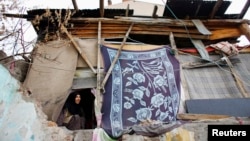Syrian refugees across the Middle East, some in exile for a fourth winter, face freezing temperatures, hunger and increasing hostility from locals as governments struggle to cope with the humanitarian crisis.
Lebanon and Jordan are tightening their borders to stem the flow of those trying to escape while in Turkey, widely praised for hosting around half Syria's estimated 3.2 million refugees, the influx threatens to upset the country's delicate social balance.
Crouched in a dank, bitterly cold room in the Haci Bayram district of Ankara, 30-year-old Hussein al-Abdullah wonders if it might have been better for him and his four children to have died at home in Aleppo than move to Turkey for a life of poverty and exclusion.
“Things are getting more separate between Turks and Syrians. No one has the patience to deal with each other anymore,” he said, before checking on his car in the street below. Three days previously someone put a brick through the windscreen.
Such hostility between local and refugee populations is growing across the region. Attacks against Syrians have surged in Lebanon, where refugees make up a quarter of the population, and in Jordan angry locals complain about competition for jobs.
As many as 100,000 Syrians have returned from Jordan rather than face discrimination and destitution, according to the United Nations.
Abdul Hadi Zamel has stayed. His son was born in a Jordanian refugee camp, where newly asphalted roads and electricity pylons point to the likely permanence of their harsh refugee existence.
“There is a great difference between our son being born in his country and born here in such a miserable conditions and this cold weather. The cold is biting for us, let alone for a newborn,” Zamel said.
Take them back
Haci Bayram is one of the Turkish capital's most deprived areas. Tumble-down buildings are being demolished and those that remain, surrounded by rubble, are either occupied by poor Turks or rented out to the 300 Syrian families living there. Often, 75 people have to share a single toilet.
Like many Syrian refugees, Abdullah, a former construction worker, speaks no Turkish, limiting his options for work. If he's lucky he will make 400 lira ($180) a month lugging crates of fruit, to pay for rent and food. The rest of the time he and his family beg, enraging his Turkish neighbors.
“Of course there are problems, but we need Turkish people to ignore these a bit ... Our country's been destroyed. We have no choice,” he said.
Angry locals accuse the refugees of poor hygiene, urinating in the streets, drug-taking, brawling and stealing. They blame President Tayyip Erdogan's government.
Although sympathy for the plight of Syrians remains high, it is largely saved for those still in Syria, or in the camps set up by the Turkish authorities near the border.
“In my 76 years living here I've never known such problems ... Erdogan brought them here. Now he should take them back,” said local resident Mehmet Balci.
Turkey has spent over $4 billion on aid and complains of scant international help, but the sheer numbers of refugees mean many live in abject conditions with little or no access to education or healthcare.
The coastal city of Antalya was reported this month as requesting special dispensation to bar Syrian refugees completely, fearing it would hurt tourism.
Frightening numbers
Turkish leaders have made no secret of their desire to repatriate some Syrians, calling for an internationally enforced “secure zone” inside Syria to house them.
The United Nations' World Food Program this week said it was suspending food aid to 1.7 million people across the region due to a lack of funding.
Some 225,000 refugees in Turkey are currently housed in overflowing government-run camps, and temporary legislation passed by the government last month will, if enforced, give legal protection to refugees.
A registration drive has reached an estimated 1.2 million refugees in Turkey, but half a million more remain outside the system, with some refusing to sign up, fearing it could hamper later efforts to seek asylum in Europe.
“The fact is, they're overwhelmed,” Jean Christophe Pegon, Turkey head of the European Commission Directorate-General for Humanitarian Aid and Civil Protection, said of the government.
The financial and social burden would rise across the region, he predicted: “The numbers are frightening, and they're going to keep on coming.”
At the al-Masaneh refugee camp in Lebanon, recent rains have overwhelmed crude drainage ditches, flooding homes and belongings with freezing water.
“The water was coming from above and below us, the mattresses were soaked,” said a despairing Abu Mohamed.
“If anyone cared about us, this would not have happened.”





